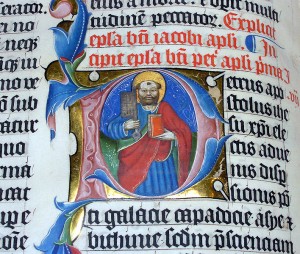Reflections on Latin and the Catholic Church’s Memory and Identity, Part One
 Part One, Latin and the Catholic Church:
Part One, Latin and the Catholic Church:
Recently I obtained the Latin text of Cardinal Lambertini’s (Pope Benedict XIV) treatise De Servorum Dei Beatificatione Beatorum et Canonizatione (“De Servorum”). After going over a couple of passages of interest, I reflected upon the treatise itself. My thoughts revolved around the place of the treatise in Catholic theological history. While on a walk I realized a connection between the treatise and some important contemporary issues: namely, the Latin language and the Church’s memory and identity. I then thought of research I have been doing on the Church’s theology of private revelation and I would like to share my thoughts over the course of several articles beginning with a reflection upon language.
Language communicates life, culture and thought.[i] In Catholicism, the Latin tongue was the language used to communicate the truths of the Faith and subsequently breathed life into her theology. It was the language that many Catholic philosophers and theologians (a number of whom are recognized saints) employed to write their own experience of the Catholic faith and ruminate upon it. Such writings form and shape the lived experience of the faith for successive generations. As Pope John XXIII wrote in his Apostolic Constitution Veterum Sapientia:
Of its very nature, Latin is most suitable for promoting every form of culture among peoples. It gives rise to no jealousies. It does not favor any one nation, but presents itself with equal impartiality to all and is equally acceptable to all. Nor must we overlook the characteristic nobility of Latin for mal structure. Its ‘concise, varied and harmonious style, full of majesty and dignity’ makes for singular clarity and impressiveness of expression.[ii]
Lambertini’s De Servorum was one such document in this tradition.
One of the most beautiful characteristics of Lambertini’s treatise is its summarization of the Church’s experience of investigating the heroic virtues of holy men and women. Though written in the 1730’s, the treatise remains a valuable resource for the various disciplines such as theology and even medical science due to its sheer depth. Regretfully, there has been a serious decline of Latin in the Church after Vatican II. An effect of this decline is that many people have become detached from such beautiful learning of which De Servorum is a part.
Such detachment makes me wonder if we have disconnected ourselves from an entire worldview that is fundamental to living out and understanding our Faith.[iii]
Pope John XXIII said in Veterum Sapientia that in employing Latin, the Church’s sacred ministers, “are better able, wherever they may be, to acquaint themselves with the mind of the Holy See on any matter, and communicate the more easily with Rome and with one another.”[iv] What would happen if Latin was suddenly and hastily removed from the Church’s life en masse? It would seem that the result could be a quasi Tower of Bab-el effect wherein a unifying language is removed and suddenly no one can understand the other.[v]
The large-scale abandonment of Latin after Vatican II led to a breakdown in understanding the mind of Rome—a mind rooted in the world of antiquity with all its learning and wisdom through the medium of language. Otherwise good and faithful lay people and clergy were left vulnerable to being swayed at least somewhat by the zeitgeist – the prevailing spirit of the age with its atheistic humanism and secularism. Others, both theologians and laymen, happily sailed along with the winds of the times, tossed about in their own makeshift theology for which they had abandoned the Tradition of the Church.[vi] This resulted in a tremendous scandal that can only be considered as a crime against the simple faith of countless people who only wanted to follow the Church and the divine laws that lead to salvation.
[ii] English translation courtesy of Adoremus. http://www.adoremus.org/VeterumSapientia.html (Accessed on August 30, 2009).
[iii] Council Father Bishop Aloysius Wycislo saw the leaving behind of Latin culture in terms of missionary work. Writing to his parishioners in the United States, the Bishop stated, “I’ve noticed here that the missionary bishops particularly are interested in adapting the Mass and the sacraments to their culture….The test will come when we vote on whether or not to throw off the iron collar of Western and Latin culture that has dominated Catholicism throughout the world.” Aloysius Wycislo, Letters from Rome During Vatican II. (De Pere: Paisa Publishing Co., 2005), 29. Bishop Wycislo’s connection of Latin/Western culture with the missionary work of the Church is legitimate but if I may add a personal note to his observation, it must also be observed that it is not prudent to abandon wholesale that culture (though I do not intend to imply Bishop Wycislo taught or believed this, especially as page 77 of the above book indicates otherwise).
[iv] Ibid.
[v] This is not a de facto result, but as history indicates, this “Bab-el Effect” did manifest itself after Vatican II.
[vi] Cf. von Hildebrand, Dietrich, Trojan Horse in the City of God. Revised Edition. (Chicago: Franciscan Herald Press, 1967), 3-7. In Trojan Horse, von Hildebrand uses the word “dilettante” to speak of the theologians and laymen.
(© 2011 Kevin Symonds)

